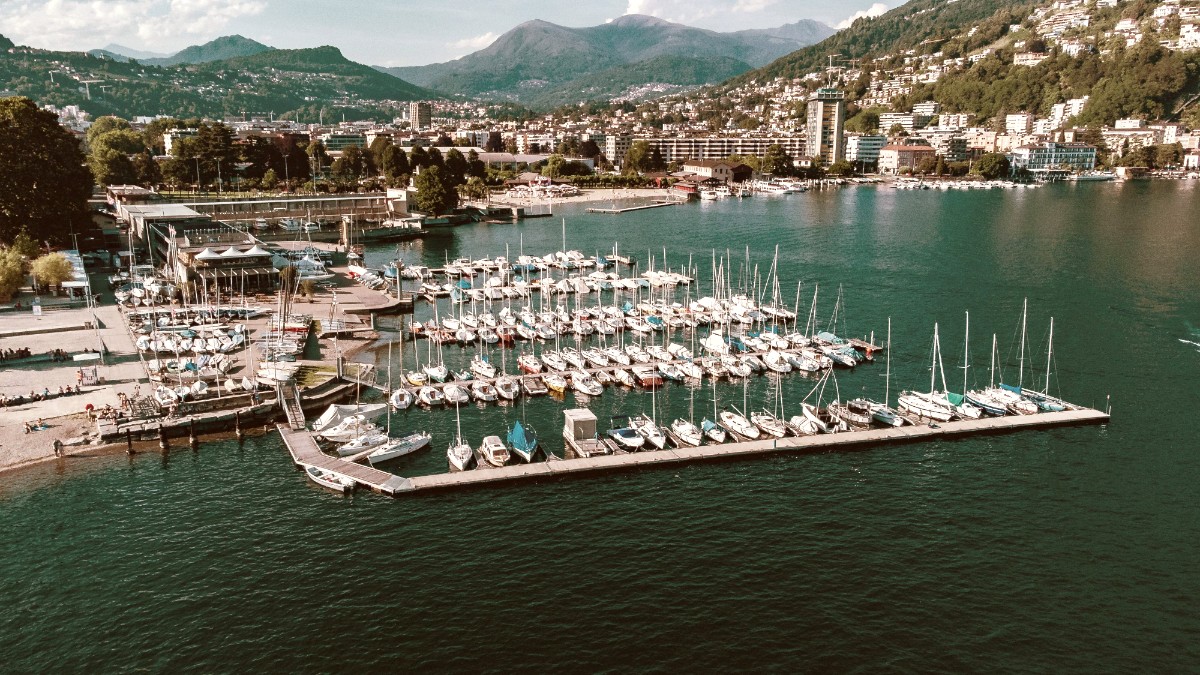
Ticino, Switzerland
Locarno sits in the southern part of Switzerland, within the Italian-speaking canton of Ticino. The city occupies a privileged position on the northern shore of Lake Maggiore, a large, deep lake that extends into Italy. Mountains surround Locarno, creating a sheltered basin. To the west, the Maggia Valley begins its ascent into the Alps, and to the north, the Centovalli region offers rugged beauty. The city's core lies at an elevation of approximately 200 meters (656 feet) above sea level at the lake's edge, with residential areas and vineyards climbing the gentle slopes behind it.
Locarno's story stretches back centuries, with evidence of human settlement dating to Roman times. Archaeological findings indicate early communities thrived here, drawn to the lake and its strategic location. During the Middle Ages, Locarno gained importance as a trading post, connecting northern Europe with the Mediterranean via the Alpine passes. The city's location at the crossroads of trade routes made it a coveted territory, contested by various powers over the centuries, including the Visconti and the Swiss Confederates.
The most noteworthy historical event tied to Locarno is the signing of the Locarno Treaties in 1925. These seven agreements, negotiated in the city, aimed to solidify the post-World War I territorial arrangements and restore normal diplomatic relations with Germany. The treaties represented a hopeful moment for peace in Europe during the interwar period, earning the negotiators the Nobel Peace Prize. This event cemented Locarno's place in international diplomacy. Beyond these political milestones, Locarno features a rich architectural heritage. The Castello Visconteo, though largely in ruins, offers a glimpse into its medieval past as a Visconti stronghold. The Sanctuary of Madonna del Sasso, perched high above the city, is a prominent pilgrimage site. Its origins date back to a miraculous apparition in 1480. These historical layers, from ancient settlements to modern diplomacy and religious devotion, give Locarno a deep sense of place. Visitors can explore these historical layers, walking through the same streets that have witnessed centuries of change.
Italian is the official language in Locarno and throughout the Ticino canton. You will hear Italian spoken in daily life, in shops, and in restaurants. Many locals also understand Swiss German, a result of tourism from other parts of Switzerland. English is often spoken in tourist-focused areas, hotels, and larger restaurants. Learning a few basic Italian phrases can enrich your experience and finds appreciation from locals.
The currency used is the Swiss Franc (CHF). Prices are listed in CHF. Credit cards are widely accepted across the city, and ATMs are readily available for cash withdrawals. While some places might accept Euros, change will usually occur in Swiss Francs, and exchange rates might not be favorable.
As of 2023.
Spoken by locals.
Credit cards accepted.
Mild winters, warm summers.
And palm trees.
Locarno offers a range of attractions that cater to varied interests. Lake Maggiore itself draws many, presenting opportunities for boat trips and lakeside enjoyment. Piazza Grande, the city's main square, acts as a lively hub for events and social gatherings. The Sanctuary of Madonna del Sasso provides spiritual reflection and panoramic views. For unique wildlife encounters, Falconeria Locarno presents impressive bird of prey shows. Cardada Cimetta, accessible by cable car, delivers breathtaking mountain vistas and hiking opportunities.
Locarno gained fame for several distinct features. Its Mediterranean climate, with palm trees and camellias, stands out in Switzerland.
The city hosts the internationally recognized Locarno Film Festival each August, drawing film enthusiasts and stars.
The beautiful lakeside promenade is a popular spot for strolls, offering scenic views and a relaxed ambiance.
Plan your visit to Locarno by considering its dual nature. It presents both serene natural beauty and lively cultural events. Reviewing event calendars before your trip supports choosing experiences.